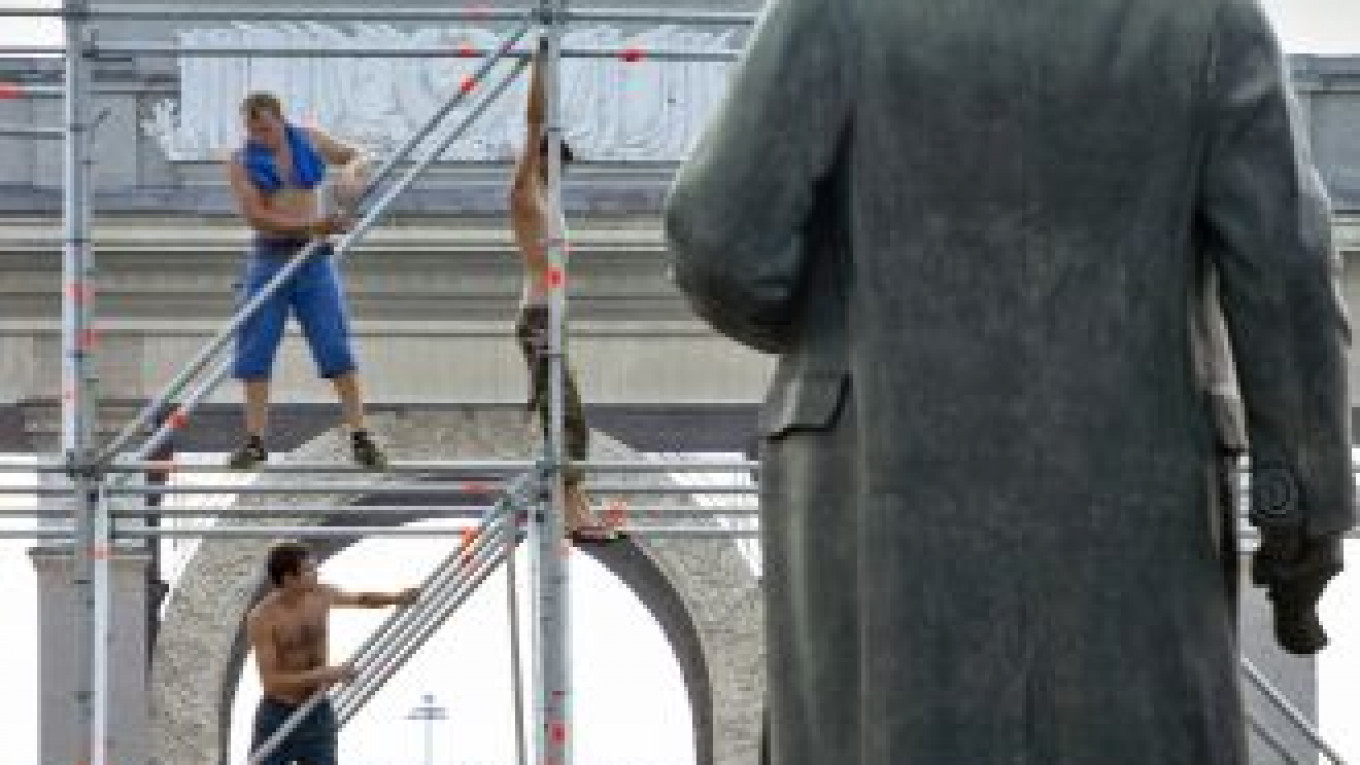The Olympic Games are perhaps the ultimate rebuttal to the old saying that "a game is just a game."
This summer's games will have special meaning for Russia, which is hoping to regain face after a dismal finish at the 2010 Winter Olympics and also build momentum for the 2014 winter games in Sochi, the first to be held in the country in over 30 years.
Russia's ambitions are modest this time: finish third in the total medals tally behind the United States and China, as it did at the 2008 Summer Games in Beijing.
"We're hoping to win between 20 and 30 gold medals," Sports Minister Vitaly Mutko said at an Olympic Committee meeting earlier this month, national media reported. Russia won 23 gold medals in Beijing.
To help with motivation, the government will award 4 million rubles ($122,500) for a gold medal, 2.5 million rubles ($76,600) for a silver medal and 1.7 million rubles ($52,000) for a bronze medal, Mutko said.
The minister stressed, however, that money wasn't athletes' primarily drive: "Our athletes are going to London first and foremost to take the winner's stand and hear their nation's anthem."
Russian and British athletes are expected to compete for third place overall, setting the stage for a rivalry that carries additional meaning against the backdrop of strained relations between the two countries.
President Vladimir Putin has not visited Britain since 2005, and tensions have risen over Moscow's refusal to extradite the main suspect in the death of Kremlin critic Alexander Litvinenko in London, as over Britain's refusal to send exiled oligarch Boris Berezovsky and other most-wanteds to Russia.
Already, Russian athletes have received a chilly welcome from the British fashion police, with the Daily Mirror tabloid describing the pattern on their red track suits as "a paisley tie/Persian rug hybrid" that caused "a surge of nausea."
Earlier, Moscow-based Bosco, which designed the uniforms, refuted rumors that American Apparel would outfit the Russian squad for the 2014 Olympics. The Sochi winter games will be the first Olympics on Russian soil since the 1980 Moscow games, which much of the West boycotted.
The Foreign Ministry, meanwhile, accused the British government of dragging its feet in granting visas to Russian Olympic volunteers.
As in years past, Russian athletes will carry the weight of their Soviet forbears, who topped the gold medal tally in all but five Olympic Games between 1952 and 1988.
The prestige of the country's athletes has also suffered from a series of doping scandals, including one involving European marathon champion Nailiya Yulamanova and two others earlier this month.
Poor performance has added to the bleak picture. The national team hit rock bottom in Vancouver in 2010, when it finished 10th overall, taking home just three gold medals amid reports of profligate spending, corruption and wild parties at the Russian compound.
Subsequently, Olympic Committee commissioner Leonid Tyagachyov and Deputy Sports Minister Gennady Alyoshin resigned. The Russian house will be alcohol-free this year, officials say.
The Russian squad in London includes 436 athletes, consisting of 208 men and 228 women — the first time women outnumber men — hailing from 59 of the country's 83 federal subjects.
Perhaps no athlete better embodies Russia's fall and rise than high jumper Ivan Ukhov, who shot to infamy in 2008 with a viral YouTube video of him competing drunk.
In the , he struggles to remove his warm-up pants, shoves a coach and flops on the mat after an abortive leap.
Four years later, Ukhov is a contender for the gold, having scored the highest jump in the world this year, 2.39 meters, at the Russian Indoor Championship in February.
Another up-and-coming medal hopeful is gymnast Viktoria Komova, 17, who finished second in the all-around category at last year's World Championship in Tokyo.
But tradition could weigh heavily on Komova's petite 150-centimeter frame. The Soviet Union won gold in the team all-around competition in every Olympics except one between 1952 and 1988, but Russia has not won the title since.
Russians will also be rooting for tennis star Maria Sharapova, who is competing in her first Olympics after missing 2004 and 2008.
In a sign of the times, Sharapova, who won the French Open in June, will become the first Russian woman to carry the nation's tricolor as athletes from around the world enter the Olympic Stadium tonight.
Any Russian team roundup would be incomplete without mentioning pole vault champion Yelena Isinbayeva, a two-time Olympic gold medalist, and pentathlete Andrei Moiseev, also a two-time champ, both of whom will attempt to defy doubts about their age.
And last but not least are the fearsome Russian wrestlers, including Greco-Roman super heavyweight Khasan Baroyev, who won the gold in 2004 and will try to avenge his silver-medal finish against Cuba's Mijain Lopez this year.
Opening ceremonies begin at 9 p.m. GMT tonight. To watch the games outdoors on a big screen, head to the fan zone at VVTs, metro station VDNKh.
A Message from The Moscow Times:
Dear readers,
We are facing unprecedented challenges. Russia's Prosecutor General's Office has designated The Moscow Times as an "undesirable" organization, criminalizing our work and putting our staff at risk of prosecution. This follows our earlier unjust labeling as a "foreign agent."
These actions are direct attempts to silence independent journalism in Russia. The authorities claim our work "discredits the decisions of the Russian leadership." We see things differently: we strive to provide accurate, unbiased reporting on Russia.
We, the journalists of The Moscow Times, refuse to be silenced. But to continue our work, we need your help.
Your support, no matter how small, makes a world of difference. If you can, please support us monthly starting from just $2. It's quick to set up, and every contribution makes a significant impact.
By supporting The Moscow Times, you're defending open, independent journalism in the face of repression. Thank you for standing with us.
Remind me later.






